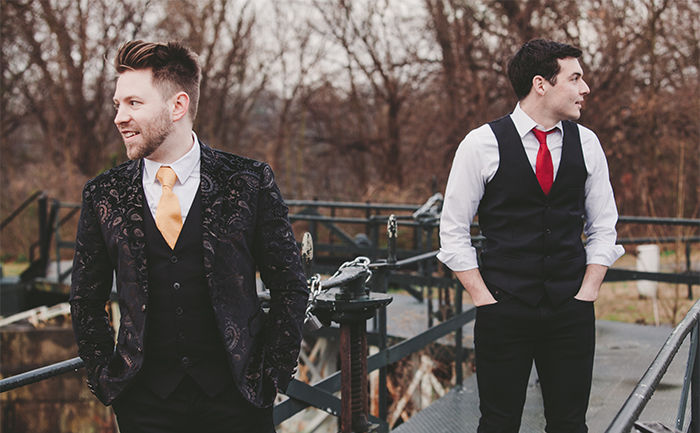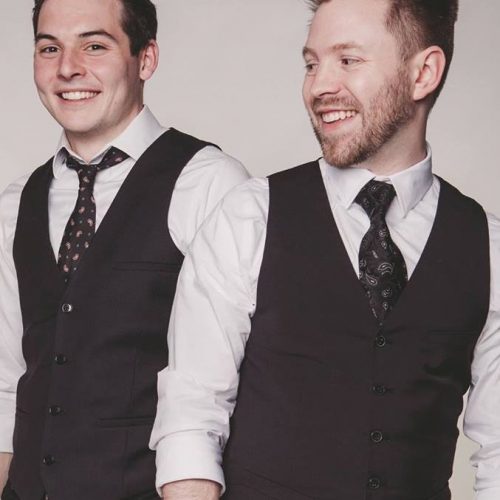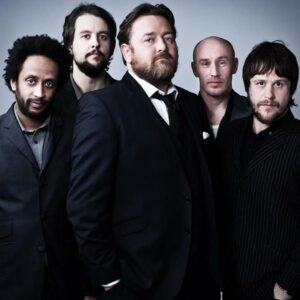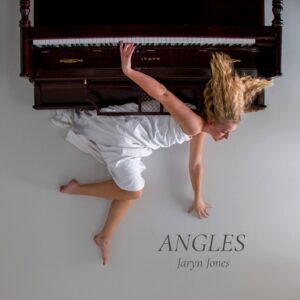I’m a sucker for catchy arena rock, so Broke Royals pretty much had me at hello.
I mean, their debut album is pretty much designed to be belted out in unison with crowds of your closest friends.
That arena-ready feel isn’t an accident bandmates Philip Basnight and Colin Cross somehow stumbled into; it’s obvious that they’re dedicated students of the rock-pop sound.
Since getting their start in a studio, they’ve honed in on smooth, “sensible pop“. And, they do it well.
The duo’s tracks are catchy and clean, blending bright synths, slick guitars, and danceable melodies into a sound that makes singalongs easy. They play to the past – shout-out to an 80s pop vibe – but, they do it in a way that feels fresh.
The first song I heard from Broke Royals was the original version of “As Long As I Can See” (it’s since been re-imagined in a Penguin Prison remix). If you’re looking for an entry point to jump into the band’s music, “As Long As I Can See” is a good place to start. It showcases a lot of the band’s strengths: soaring melodies, cohesive production, and an attention to cultural nuance in the form of an awesome music video featuring American Sign Language (which is something that you really should watch).
The song that really connected with me, though, is one of the deeper tracks on the self-titled Broke Royals – “Seth Jordans”.
It’s a track that slightly deviates from the sonic of the rest of the album, but I think that’s what makes it so appealing; featuring an early 2000s bubblegum-bright synth line and nostalgia-inducing lyrics about changing relationships, it feels like something I’d have put on repeat on my blue iPod nano while I was growing up.
Give it a listen. Then, dive into Broke Royals’ creative process below, and learn how they shape songs that make you want to sing along.
And, check out their website here.
When did you start writing songs? How’d you get into it?
Philip: I’ve been writing songs since I was about 14. One of the earliest songs I remember working on was a John Lennon-style song called “Mountain Man.” I wrote it down in a Composition Notebook that’s probably still in a storage box somewhere. Back then, like now, the writing process began by chasing melodies on an acoustic guitar. Over the years, I started add synth elements on top of that. That’s why Colin and I had so much to work on from the start. I had all these acoustic songs where I envisioned synth parts and he was able help me with arrangements and structure. Together we took the songs from their stripped down parts and transformed them into the fully realized versions.
Colin: I first started writing songs when I was 15. I played guitar in a midwest pop-punk group for several years and in that group realized that I love piecing together all the different elements of a song and working with structure to make things both accessible yet compelling. When I met Philip, it was a perfect match.

What was your first song? What was it like?
Philip: Oh you mean Mountain Man? It was very ambitious. I wanted it to be like John Lennon’s solo work, which is bold for a 14 year old. That’s the kind of blind ambition I probably wouldn’t dare today. At the time, I really loved ‘Watching The Wheels” and “Working Class Hero.” I wanted to write an acoustic-driven ballad with biting social commentary, though I certainly couldn’t have articulated it like that. Also, side note, can you imagine living the crazy rock star life that John Lennon lived while still possessing the ability to make such astute social criticism? You’re not seeing much of that today. Maybe Kendrick. But John Lennon really was a legend.
Why do you write songs? What’s your goal when you write a song?
Philip: That changes depending on the day, but the short answer is that I don’t have much of a choice. Songwriting is a huge part of my well-being. From a very young age, I’ve processed my emotions through songwriting. I’ve used my piano, voice, and guitar to work through success, failure, and deep tragedy. I will always write songs, even if it’s for no one to hear. In fact, the songs that you never show anyone are often particularly special.
Colin: I am always chasing that feeling you get when you’re working on something and all of a sudden you cross the threshold into something super compelling. All of a sudden when I’m working on something things will just click and I’ll just sit back and say, “damn, that’s cool.” Sometimes that moment is way later when we’re adding the final elements to the completed song, sometimes it’s right away in a song idea and you have to just run with it.
Do you think songwriting is more selfish or unselfish?
Philip: That depends on who is writing it and why. Songs for me usually start with an emotion or something that I can’t get out of my head. It’s cathartic. I always want things to be relatable and, as a result, I like to think that our music brings people relief and hope. But there’s a 2Chainz song where he opens with “money’s the motivation.” I’d love to write a song like that. I’m not even saying he’s being selfish, I don’t know what he’s doing with his money and, moreover, that’s not for me to say, but I would love to feel that sort of motivation one day. To write a song where money is the motivation. That’s really foreign to me but it sounds fun.
Who are your influences?
Philip: Prince.
What is your favorite song of all time, and why?
Philip: “All My Friends” by LCD Soundsystem or “You’ve Really Got A Hold On Me” by Smokey Robinson and The Miracles.
Colin: “Anything You Want” by Spoon, “Mr. Brightside” by The Killers, or “Without You” by Brighten.
There’s just something about all of them. Each moves you in their own way, you know?
What makes music or a song good?
Philip: It’s good if you like it. I spent way too long telling people what music kind of was good and what kind of music was bad. There are certainly types of music I think are worthy of more time and attention but telling people certain types of music are bad just builds walls.
Colin: I definitely agree with Philip here. I appreciate things that are intriguing or have particularly thoughtful lyrics, but, at the end of the day, I respect all music and think everyone’s preferences are 100% valid.
How do you write? Do you start with lyrics or melody? Chorus or verse?
Philip: Just like back in the day, I usually start by focusing on vocal melody or lead line with accompanying chords on a guitar or piano. I’ll build a demo sketch and send it to Colin. He adds drums, bass, and often proposes a new structure. Then we’re really cooking. But sometimes it all happens in the studio simultaneously. “Heartless Come Around” developed all at once in the studio.
Colin: I’ll also often spend time playing with guitar licks as the song plays through while Philip is tracking scratch vocals- see what works around the main melody as it starts to shape up, attempt to fill the spaces in between, etc.
How do you write a melody?
Philip: Melodies are like waterfalls. Don’t go chasin ‘em. The best ones always come to you. That’s why you always have to be ready to receive them and get to work. I once heard that Michael Jackson kept a tape recorder on the nightstand next to his bed because he was afraid God would give the melodies to Prince if he didn’t record them right away. I definitely relate to that kind of reverence for a new melody, however, I also find that the best melodies will come back to you even if you forget to record them. That’s where the line “the good ones always come back if you wait” comes from in our song “Falling Up.”
How do you write lyrics?
Philip: For me, writing lyrics is a much more laborious process. I keep notes on my phone with ideas but crafting lyrics around a melody or theme takes a lot of work. When I’m in the final stages for writing lyrics, I listen to a lot of poetry. I love picking up on cadence, inflection and meaning through poetry readings. Even if they’re really lo-fi recordings like the ones you find of T.S. Elliot.
What emotions, thoughts, feelings do you want your music to inspire?
Philip: Hope and love. Broke Royals loves you when nobody loves you.
What role does production play in your writing?
Philip: A huge part. We started in a studio! Colin has done such an amazing job working on the literal sound of the band. He’s mixed everything we’ve ever done, as well as many other amazing albums.
What advice would you give other songwriters?
Colin: Finish as many songs as possible. Don’t get hung up on making the “perfect” song. You’ll learn and get new ideas from everything you finish that will make the next thing better. We wrote and recorded around 30 songs for this album and that really enabled us to only take the strongest songs forward when we were decided on final track listing.
What was the first part of “Seth Jordans” to be written? Lyrics, the melody, the track?
Philip: That lead synth line at the beginning! That’s one of my favorite parts of the whole album.
Is it about a personal experience? Would you be willing to share?
Philip: Very much so. I live in DC and when I wrote this song I had a few good friends who were leaving the area for new cities or experiences. It’s about trying to determine if I would still love the city after they left. Good news is the answer was yes; I love DC. But watching your closest friends leave is painful and cause for reflection.
Did you write this for yourself, the friends who left, or a more general audience of people?
Philip: It’s about a group of people, addressed individually, and the end of an era. It’s the mixture of nostalgia and confusion that comes when people go their separate ways.
What’s your favorite line from the song?
Philip: “They’re inside my head saying ‘don’t look over, don’t look over’ / There inside my head”
It’s a play on ‘Boys Of Summer’ by Don Henley and a classic “they’re/there” switch up.
This song caught my ear because it has more of an early 2000s alt-pop vibe to me – sounds like what I grew up listening to. How did the sound come, and how does it impact the meaning of the song?
Philip: This one was a pretty classic BR songwriting process. It started with an acoustic demo then got built up and restructured. But I always had that intro synth line in my head. The synth sound we used there has a wonderful brightness. We wanted it to sound like an 80s pop song or 00’s alt-pop like The Killers ‘Smile Like You Mean It,’ so I’m glad you got that vibe!
Any details you’d like to share on the recording or production process?
Philip: The “oh oh oweeoh” vocals on the pre-chorus were one of the final elements that we added by messing around in the studio but I think they’re a highlight. It reminds me of Danny Elfman’s soundtrack for The Nightmare Before Christmas but just briefly.
What’s next for you guys in terms of shows and music?
Our album release show is in Washington DC on December 28, 2017 at Union Stage, which is a brand new venue opening up in The Wharf district. We will be one of the very first bands to play there. We’ll also be at Rockwood Music Hall in New York on 1/11 and The Broadberry in Richmond, VA on 1/19! All dates can be found at www.brokeroyals.com











